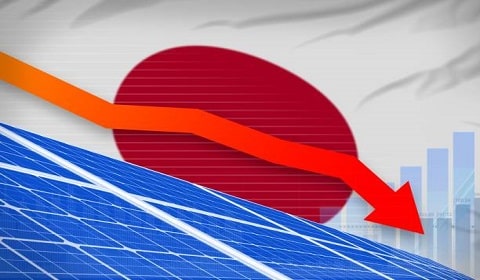
Japan's Economic Recession: A Threatens to Global Market
Japan’s economic recession have sparked concerns as the nation unexpectedly plunged into recession due to weakened domestic consumption, relinquishing its position as the world’s third-largest economy to Germany.
The Bloomberg reveals a contraction in Gross Domestic Product (GDP) at an annualized pace of 0.4% in the final quarter of 2023, following a 3.3% decline in the previous quarter.
The slump, contrary to market forecasts, underscores the vulnerability of Japan’s economy, with major domestic demand categories, including consumer spending, registering negative growth. Moreover, external demand, buoyed by exports, remains the only bright spot amidst the downturn.
Japan’s Economic Recession
Japan, once hailed as an economic powerhouse, has hit a roadblock as its economy unexpectedly contracted, leading to a recession. Japan’s economic recession has seen the country lose its position as the world’s third-largest economy to Germany.
The latest data reveals a contraction in Gross Domestic Product (GDP), highlighting vulnerabilities in domestic consumption. Despite ongoing challenges, analysts remain cautiously optimistic about potential rebounds in the coming months.
In this article, we delve into the reasons behind Japan’s economic recession, its implications, and the outlook for the future.
Table of Contents
1. Economic Contraction and Recession
Japan’s economy experienced an unexpected setback as its gross domestic product (GDP) shrank by 0.4% in the final quarter of 2023, marking a second consecutive quarterly decline after a 3.3% drop in the previous quarter.
This downturn officially pushed Japan into recession, meeting the criteria of two successive quarters of economic contraction. The extent of the decline was below market forecasts, prompting worries about the resilience of Japan’s economic structure.
These figures underscored the challenges facing Japan’s economy, raising questions about the effectiveness of its policies and strategies in navigating through uncertain economic conditions. Japan’s economic recession further highlighted the need for comprehensive and effective measures to stimulate growth and stabilize the economy.
2. Loss of Global Economic Standing
The recession precipitated Japan’s fall from the world’s third-largest economy to Germany, marking a significant shift in global rankings. This transition underscores Japan’s profound economic struggles and emphasizes the imperative for strategic interventions to reignite growth.
Japan’s economic recession has exacerbated these challenges, further highlighting the need for proactive measures. Japan’s longstanding position, once unassailable, now symbolizes the complexities of economic resilience in the face of adversity.
As Germany ascends, Japan grapples with the ramifications of its diminished status, compelling a reevaluation of economic policies and priorities. The urgency to revive growth momentum is palpable, demanding innovative approaches and concerted efforts to navigate the turbulent economic prospect and reclaim Japan’s competitive edge on the global stage.
3. Weak Domestic Consumption
Japan’s economic downturn was largely spurred by feeble domestic consumption, with all major demand categories, notably consumer spending, registering negative figures despite growth expectations. The fourth quarter saw private consumption, constituting half of Japan’s economy, plummet by 0.9%, indicative of enduring consumer hesitance to spend.
Escalating prices for vital commodities such as food and fuel worsened the situation, eroding consumer confidence and purchasing ability. This trend highlighted a prolonged period of economic stagnation, with the populace grappling with diminished spending propensity amid a challenging economic situation.
Japan’s economic recession further compounded these challenges, exacerbating the already fragile state of the economy.
4. Impact of Natural Disasters
Japan faced compounded economic challenges exacerbated by natural disasters, notably the Sea of Japan earthquake in January. These calamities disrupt economic activity, prompting reduced spending and scaled-back operations.
The earthquake’s toll on lives and infrastructure worsened Japan’s already fragile economic state, deepening contractions in consumer spending and overall economic activity. This compounding effect underscores the vulnerability of economies to natural disasters and highlights the need for resilient infrastructure and effective disaster response mechanisms.
Japan’s economic recession, further fueled by the aftermath of the earthquake, amplifies the urgency for recovery efforts. These efforts require strategic economic planning alongside comprehensive measures to mitigate the impact of future disasters, ensuring stability and resilience in the face of adversity.
5. Positive External Demand
Despite domestic challenges, Japan discovered a ray of optimism through heightened external demand. The fourth quarter showcased an impressive 11% annualized surge in exports of goods and services, propelled by a depreciated yen.
Additionally, inbound consumption, inclusive of tourist expenditure, notably escalated, injecting a vital stimulus into overall economic expansion. However, this positive momentum is tempered by Japan’s economic recession, which poses significant challenges to sustained growth.
Nonetheless, Japan’s heavy dependence on external demand leaves its economy vulnerable to global uncertainties and fluctuations in exchange rates.
While these positive trends offer respite, they underscore the importance of diversifying Japan’s economic strategies to mitigate risks and foster sustainable growth in the face of an ever-changing global scenery.
Prospects for Recovery
Despite a challenging economic aspect, optimism persists among economists regarding Japan’s recovery. Key factors contributing to this sentiment include stabilizing inflation rates, anticipated wage increases, and robust corporate earnings, all of which are poised to stimulate private consumption and investment in the near future.
Business surveys and labor market indicators paint a more positive picture of the economic environment than headline GDP figures might suggest. Additionally, there is anticipation of upward revisions to GDP data, coupled with government efforts to boost growth, which could further underpin the country’s economic rejuvenation.
However, Japan’s economic recovery faces headwinds due to Japan’s economic recession, but despite enduring challenges, Japan’s strong economic fundamentals and proactive policy responses offer grounds for cautious optimism concerning its trajectory ahead.
Bottom Line
Japan’s recent economic contraction, exacerbated by Japan’s economic recession, highlights its susceptibility to domestic and external shocks, emphasizing the need to address structural weaknesses. Diversifying growth drivers and bolstering domestic demand are vital for long-term economic resilience.
To regain lost ground globally, Japan must implement strategic measures aimed at fostering innovation, enhancing productivity, and promoting sustainable development. Embracing technological advancements, investing in education and infrastructure, and fostering a conducive business environment are crucial steps towards revitalizing the economy.
Proactive policies aimed at stimulating investment and consumption, coupled with prudent fiscal management, can help steer Japan towards a path of sustainable growth and prosperity amidst challenging global conditions.





